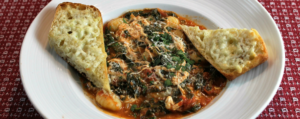 HYANNIS – In today’s busy world, a lot of families find it hard to find time to shop for groceries and cook healthy dinners. Many are turning to the new meal kit services that deliver all of the ingredients for a full meal right to your door. The kits come with glossy photos, recipe cards, and premeasured ingredients that have dinner on the table in 30 to 40 minutes.
HYANNIS – In today’s busy world, a lot of families find it hard to find time to shop for groceries and cook healthy dinners. Many are turning to the new meal kit services that deliver all of the ingredients for a full meal right to your door. The kits come with glossy photos, recipe cards, and premeasured ingredients that have dinner on the table in 30 to 40 minutes.
Sure these meals are convenient, but are they actually healthy? We asked two of Cape Cod Healthcare’s clinical dieticians for their opinion on the meal kits. Both said that the meals have pros and cons. The key to keeping the meals healthy is to choose carefully.
“I think that the meal delivery services are a great way to get people involved in cooking their own food and preparing their own recipes,” said Mallory Doolan, RDN, a dietician at Falmouth Hospital, who is considering signing up for a meal kit plan herself after researching them.
“Someone who might not cook regularly might be willing to cook something that comes pre-prepared and I think they’ll tend to still be lower in calories than some of the food you eat out in a restaurant. But like all foods and meals, you need to look really closely at the nutrition facts and pay attention to the salt, fat and sugar content.”
Rachel Songer, RDN, at Cape Cod Hospital likes the fact that the meal kit companies allow people to choose meal options like vegan or gluten-free as well as what type of protein they prefer.
“They get people to try new foods and new cooking methods,” she said. “Most recipes are easy to make and convenient and they provide a meal card with all the ingredients and instructions so you can remake the recipe another time, if desired.”
But not all the meal choices are healthy for all people. For example, when she examined the spinach gnocchi recipe from Blue Apron, she had concerns.
“That meal is definitely too high in saturated fat and sodium for those who have any kind of cardiovascular disease like high blood pressure, congestive heart failure, coronary heart disease or high cholesterol who need to limit those specific nutrients,” Songer said.
A close examination of the recipes from Plated revealed that some of the meals are high in calories, fat and sodium as well, she said. She sampled a meal of skillet roast chicken with caramelized fennel and potatoes. She noted that Plated only lists the calorie per serving amount on the recipe card, but didn’t break down how much fat or what kind of fat there is or how much sodium is in the recipe. These are important considerations for a lot of people.
Some of the companies let you choose what you want by dietary restrictions. Chef’d partnered with the American Diabetes Association and had dieticians create menus specifically for people with diabetes, Doolan said. She also pointed out that because most of the meal kits are freshly prepared, you can adjust seasoning and fat content on your own by leaving certain ingredients out to make them healthier.
Doolan offered the following dietary guidelines:
- Sodium: less than 2,300 mg/day and less than 1,500 mg/day for those with high blood pressure, diabetes or kidney disease.
- Sugar: less than 10 percent of your total calories for the day.
- Saturated fat: less than 10 percent of total calories for the day
- Calories: the dietary guidelines are based on 2,000 calories a day, but the actual number of calories depends on activity level and other factors. If you have questions, it’s best to consult a registered dietitian nutritionist
Patients should consult a registered dietician nutritionist with any questions on these recommendations, Doolan advised.
“Being able to dissect a food label and realizing whether this is a good choice or not is an important skill,” she said.
Yarmouth Port resident Tracy K. Anderson has tried over 50 different meals from three different meal companies. At first she was a little skeptical because she enjoys cooking. Now she orders about three meals a week from one of the companies.
“I still get to cook, which I love to do, but I’m still figuring out a couple of meals a week on top of the boxes,” she said. “I feel like it’s a good balance.”
Anderson started with Green Chef, which specializes in organic food. She thought the quality of the food was great, but the kits included premade sauces, which she found to be too salty. She also questioned the amount of packaging.
“At one point we got one organic egg and it had its own sticker inside a box inside bubble wrap inside another little plastic container,” she said. “But the food arrived in pretty pristine condition.”
The meal kits range in price from about $8.50 to $13.50 per serving, depending on the company, with some high-end meals costing up to $22. Anderson feels like she is saving money because there is no waste.
The plan she uses the most often is Plated, which offers up to a dozen choices each week. She generally chooses chicken, beef or vegetarian options and prefers fresh local seafood to the frozen fish in the kits.
“As a home cook, it has given me a lot of ideas and techniques for things,” she said. “I keep all my recipes in a notebook and I’ve definitely used some of them again buying my own ingredients.”
Anderson has also sampled Chef’d, which she said is more expensive, but you don’t need a subscription. You just need to order two meals to get the free shipping.
“Like most people, I’m busy and I really do think this is a huge time saver,” Anderson said. “It’s a good compromise. I wouldn’t do it for every meal, but a few times a week is nice.”
For anyone who would like to compare the top eight meal kit choices, Doolan recommends reading an article published in Today’s Dietician Magazine.























